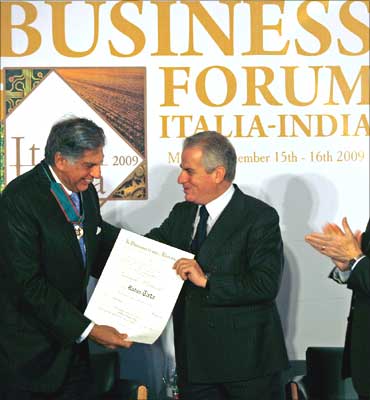
The job of Tata Sons chairman might be the most prestigious in India Inc, but it comes loaded with challenges, Bhupesh Bhandari.
Winds of change are blowing across Bombay House. A committee of five has been set up to look for a successor to Ratan Tata.
He is 72 and will retire as the chairman of Tata Sons, the holding company for the Tata group, in December 2012.
But the company is keen to name his successor by early next year so that Ratan Tata can put him through his paces. Several names are doing the rounds: Carlos Ghosn, Indra Nooyi, Arun Sarin and Noel Tata, to name a few.
A large number of people see Noel Tata as the front-runner; he is after all Ratan Tata's half brother. There will be more clarity in the next few months. Ratan Tata has said his successor need not be Parsi; the man best suited to the job will be selected.
Changes in the corner office at Bombay House do not happen very frequently.
Ratan Tata has occupied it since 1991. Before him, JRD Tata held the office for 53 long years, starting from 1938.
Interestingly, each of them has faced a different set of challenges, just like Ratan Tata's successor will have to grapple with a whole new lot of issues.
Click on NEXT to read more...
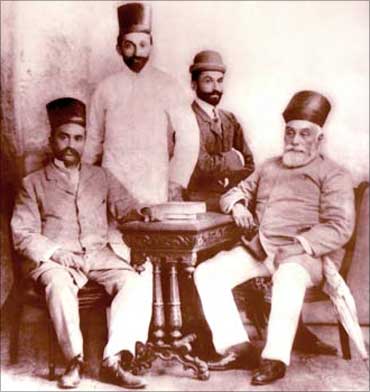
Till Independence, JRD Tata had the good fortune of working in a free economy.
The opportunities were fewer, but there were no restrictions. And he was politically correct too. JRD Tata was one of the seven architects of the Bombay Plan of 1945.
It talked of doubling the farm output and raising industrial production four-fold with an investment of 10,000 crore ( 100 billion).
In addition, it talked of state intervention for an equitable society, transition from an agrarian to an industrialised society and a strong public sector in key sectors.
It was a precursor to the first Five-Year Plan that Jawaharlal Nehru rolled out in 1950.
The communists slammed the capitalist authors of the Bombay Plan, the rightists saw it as a harbinger of socialism, and the centrists said it was a pitiable apology from these businessmen after they had made super-normal profits during the Second World War.
Click on NEXT to read more...
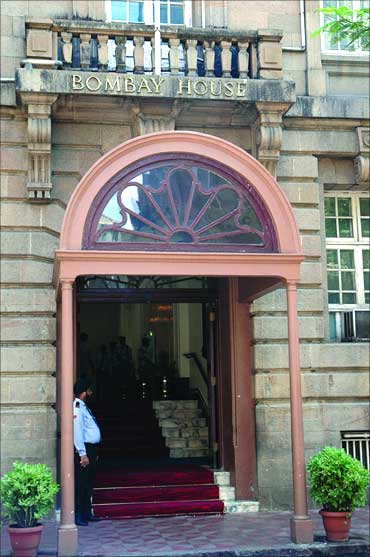
Things took a U-turn after Independence. What happened surprised even the authors of the Bombay Plan. Industrial licensing was brought in, the insurance venture of the Tatas and their airlines were nationalised.
Thus, what Ratan Tata inherited was small, fragmented and inefficient. The licence raj had pushed Indian businesses into the middle ages.
The group had a foot in almost all businesses, yet none was of any noteworthy scale and the bulk of its profits came from a handful of companies.
The economy was opening up, and Indian enterprises were simply not efficient enough to face the challenge.
In addition, there were satraps well ensconced in various companies: Russi Mody in Tata Steel, Darbari Seth in Tata Chemicals and Ajit Kerkar in Indian Hotels.
Ratan Tata knew it was essential to take a holistic view of the group. But that could not happen so long as these satraps were around.
Click on NEXT to read more...
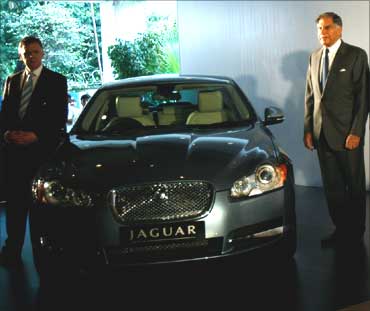
In the first phase, Ratan Tata reorganised the businesses - some were sold, the remaining were asked to tighten their belts and become efficient.
All the satraps were removed. In the second phase, Ratan Tata really grew the business. He bought Tetley, the truck business of Daewoo, Corus and Jaguar-Land Rover.
These were the large purchases he drove. There were several smaller acquisitions as well. He created waves the world over when he launched the Nano for as low as Rs 100,000.
What Ratan Tata will leave for his successor will be vastly different from what he inherited from JRD Tata.
Of course, the size of the group is much bigger now - $71 billion. As much as 65 per cent of the group's revenues now come from abroad. It has operations spread across the world. This is the first requisite of the job.
The new Tata Sons chairman should have a global world view and the ability to carry people from different nationalities together. The later acquisitions like Corus and Jaguar-Land Rover need to be taken to their logical conclusion.
A majority of acquisitions - more so cross-border acquisitions - fail because the buyer overlooks the softer aspects of integration.
Click on NEXT to read more...
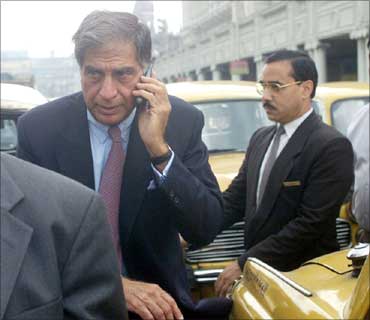
Management gurus will tell you that here Indians are placed better than the Chinese because they deal with ethnic diversity everyday in office.
Two, the group will have to find more solutions for the bottom of the pyramid. That is the core competence of any conglomerate headquartered in India.
What next after the Nano and the low-priced water purifier? It is an open secret that several other projects are in the pipeline in areas like medicine, nanotechnology and telecommunications. Ratan Tata's successor will have to ensure that most of these become a commercial reality.
Three, the new chairman will have to press the accelerator on innovation. The Tata group, it is often said, is not innovative enough, given its size and ambitions. Ratan Tata has set in motion plans to boost innovation within the group.
Even the smallest innovation is recorded and rewarded. Intelligent failures are encouraged. It needs to be accorded the highest priority.
The job of Tata Sons chairman might be the most prestigious in India Inc, but it comes loaded with challenges.